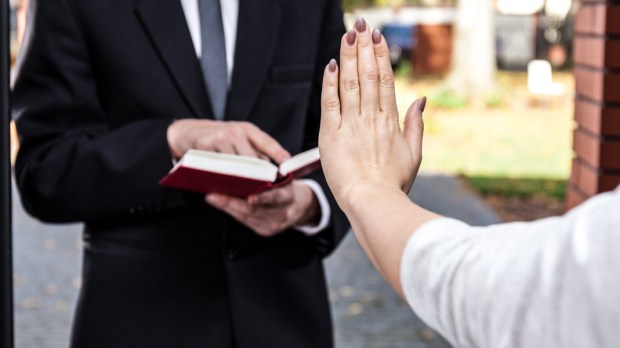The pacifistic religious group known as Jehovah’s Witnesses has been declared an “extremist group” in Russia and forbidden to carry out public activities.
Russia’s Supreme Court on Thursday accepted a request from the justice ministry that the Jehovah’s Witnesses be considered an extremist group and ordered its national headquarters in St. Petersburg and all 395 local churches closed. It banned all their activity immediately, and ordered their property seized by the state.
This is the first time that a court has ruled that a registered national centralized religious organization is “extremist” and therefore banned, according to Forum 18 News Service.
The Jehovah’s Witnesses intend to appeal Judge Yury Ivanenko’s decision and have said that, if necessary, they will take their case to the European Court of Human Rights in Strasbourg.
Russia’s estimated 170,000 Jehovah’s Witnesses now risk criminal prosecution if they continue to meet for prayer or Bible study, Forum 18, a religious freedom monitoring organization, said:
Any attempt by Jehovah’s Witnesses to share their beliefs, even within the restrictions of the July 2016 so-called “missionary amendment” to the Religion Law, will now be illegal, as the amendment prohibits any missionary activity by former members of banned “extremist” organizations (see Forum 18’s “extremism” Russia religious freedom survey). The July 2016 changes also imposed harsh restrictions on anyone sharing any religious beliefs, including where and who may share them, as part of alleged “anti-terrorism” changes (see Forum 18’s general Russia religious freedom survey).
The news service said that Russia’s Federal Financial Monitoring Service (Rosfinmonitoring) had already added the Jehovah’s Witness Administrative Center to its list of “organizations, against which there is evidence of involvement in extremist activity or terrorism,” and the Center’s financial transactions are already blocked.
The United States Commission on International Religious Freedom said Friday it is disappointed, but not surprised, with the ruling.
“The court’s decision sadly reconfirms the disregard of the government for religious freedom in present-day Russia,” commented Jesuit Father Thomas J. Reese, chairman of the commission. “Individual and community expressions of faith, and even private religious beliefs, are not safe from state-sponsored repression and coercion in Russia today.”
And Sen. Roger F. Wicker (R-MS), chairman of the Commission on Security and Cooperation in Europe, also known as the U.S. Helsinki Commission, an independent agency of the Federal Government charged with monitoring compliance with the Helsinki Accords, stated: “People who practice their faith peacefully should never be in danger of being harassed, fined, or jailed. The court order to seize organization property owned by Jehovah’s Witnesses adds insult to injury.”
But Daria Kirjanov-Mueller, who teaches Russian at the University of New Haven in Connecticut, said the development needs to be seen in the context of the the Law on Freedom and Religion enacted under former President Boris Yeltsin in 1997. In the first years after the fall of the Soviet Union, the Russian Orthodox Church-Moscow Patriarchate “was struggling to serve a huge population of atheists just finally entering into a post-Soviet reality and ready and excited to take on a faith,” Kirjanov-Mueller said. “There was competition, but the majority of the seekers sought Russian Orthodoxy. Nevertheless, there was a selection of religions, and the Russian Orthodox Church lost many ‘native’ Orthodox to various other Christian and non-Christian denominations.”
The 1997 law was meant to address the “unwelcome competition” between the Moscow Patriarchate and other Christian denominations, she said.
“Several churches foreign to Russia were barred from registering” as official religions, Kirjanov-Mueller said. “Twenty years later, the situation has not changed much. The main issue as I see it lies in the fact that the Moscow Patriarchate, along with other branches of the Russian Orthodox Church (such as the Orthodox Church of America) as well as with the support of the Muslim clerics, sees such religious groups’ activity in Russia as a threat. They actually do not see them as pacifist, because their methods are quite activist and, perhaps in the Russian view, ‘extremist.’ Proseletizing is not a part of the religious culture in Russia, and many Russians, as well as the government and the religious establishment are suspicious of it.”
Jehovah’s Witnesses are not the only ones affected, she said. The law applies also to Mormons and Seventh Day Adventists, for example.
She said that the Orthodox in the south of Russia are generally very religious and see groups such as 7th-Day Adventists as competition. “There have been many examples of people from Christian [sects] going into Orthodox churches and distributing literature or in some way disturbing church services,” she said. “They go door to door…and the Russian Orthodox Church sees them as aggressive because they talk to people very openly, they give out literature, they often say very negative things about the Russian Orthodox Church, they’re very good at debating. … They are being perceived — by a very conservative religion that is in the process of reshaping itself and has been doing so for 25 years after a very long time of atheism — they are being perceived as the guys coming in and taking away our future converts.”

